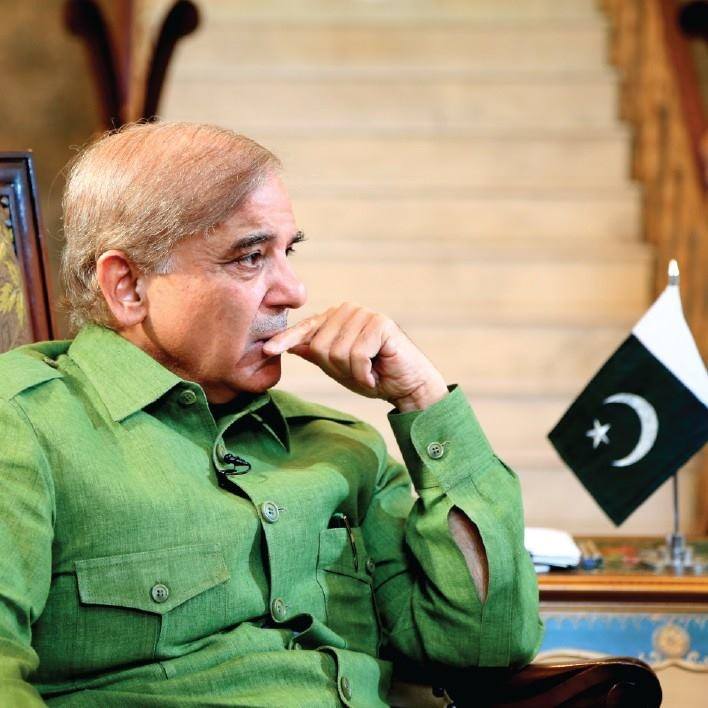Says Youm-e-Takbeer day signifies Pakistan’s strength; Stresses national unity for country’s solidarity
Commemorating the 24th anniversary of becoming a nuclear power, Prime Minister Shehbaz Sharif stressed on Saturday on attaining economic sovereignty and self-dependence.
In a series of tweets on the occasion, the premier said the nation would have to move ahead with the same spirit as manifested on Youm-e-Takbir.
On May 28 in 1998, Pakistan successfully carried out five nuclear tests in Chaghi, Balochistan. The successful nuclear explosions made Pakistan the first nuclear power in the Muslim world and seventh in the world.
In a message on the silver jubilee celebration of the country’s nuclear tests, Premier said the day was a clear declaration of ‘no compromise over country’s sovereignty, and defence’ and served as a reminder that for the defence, solidarity and national interests, they would not budge from any sacrifice.
He underlined that it was a day to get united for the solidarity of the country as it was the main strength of the nation and expressed his determination that with such unity, hard work and staunch faith, they would turn Pakistan into ‘an economic power’.
The prime minister paid tribute to the patriotism of former prime minister Muhammad Nawaz Sharif, who enabled Pakistan “to hold its head high among the comity of nations with pride”. Shehbaz said the former prime minister had rejected all the pressure and temptation to make Pakistan the seventh nuclear world power and the first Islamic country possessing nuclear deterrence. He also lauded ex-prime minister Shaheed Zulfikar Ali Bhutto, the founder of Pakistan’s nuclear programme, and paid rich tributes to all those who had worked during the tenures of Zulfikar Ali Bhutto to Nawaz Sharif for making the defence of the country invincible including scientists, engineers and others. The prime minister said the armed forces of the country had rendered valuable services for the country’s nuclear programme which had been a golden chapter in its history.
He also appreciated the Pakistan Atomic Energy Commission which played a vital role in the defence and solidarity of the country, adding that they also remembered Dr Abdul Qadeer Khan, (Mohsin-e-Pakistan) who had spent his whole life serving the country. The prime minister expressed his gratitude to Saudi Arabia and other brotherly and friendly countries that had helped Pakistan during economic sanctions. The prime minister said the mountains of Chaghi still echoed with the same resolve, and the province of Balochistan still bore distinction with regard to the country’s defence.
The prime minister further stressed that 10-day celebrations should be dedicated for the nation’s unity and progress and prosperity of the country. The Government of Pakistan also posted a video message on its official Twitter page. “We never bowed down [to anyone], nor shall we; we became a nuclear power, [we] will become an economic power,” the tweet maintained. In a statement, the Inter-Services Public Relations said that, “24 years ago on 28 May 1998, Pakistan established credible minimum nuclear deterrence, restoring balance of power in the region.”
“[The] Armed Forces pay tribute to all those who worked selflessly, stayed steadfast against all odds and made this possible,” the military’s media wing added.
The Foreign Office, in its message on the occasion, said the nuclear tests conducted in 1998 had not only demonstrated the nation’s resolve to safeguard the country’s territorial integrity, independence and sovereignty but also its determination to preserve the strategic balance in South Asia.
“Pakistan is committed to the promotion of environment of peace and stability in South Asia, while preserving its capability to ward off aggression or adventurism in any form. It is a partner in international efforts to strengthen the global non-proliferation regime based on the principles of non-discrimination and equal security for all states. “It adheres to the latest international standards on export controls and maintains highest standards of nuclear safety and security,” FO spokesperson Asim Iftikhar said in a statement. He said that threats to the region’s strategic stability highlighted Pakistan’s Strategic Restraint Regime, which includes measures for the resolution of outstanding issues including the Kashmir dispute, nuclear and missile restraints and conventional balance.










